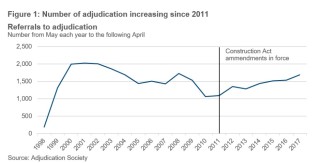The first consultation concerns the practice of cash retention under construction contracts, while the second is a consultation undertaken to inform the Post-Implementation Review of the 2011 Amendments to the Construction Act of 1996, covering general construction payment issues and the dispute resolution framework.
The consultation processes ran from 24th October 2017 to 19th January 2018 – the construction industry may have been forgiven for thinking that the government had forgotten all about us in the intervening years of inaction.
The consultation on retention payments in the construction industry1 unsurprisingly found that while the principle of cash retention – to guarantee performance and eliminate defects – is generally sound, payment abuse is rife throughout the construction supply chain, and cash retention is just one issue amongst a range of payment practices prevalent in the industry. “The underlying driver of retention abuse is cash flow. ‘Cash is king’ and temptation exists to utilise the funds for other purposes,” the summary of responses says.
There was broad support for a retention deposit scheme, where the money is held by a third party. Some wanted retentions not just reformed but banned altogether.
The Department for Business, Energy & Industrial Strategy (BEIS) said: “This consultation has provided a useful basis for ongoing work. It illustrated the breadth of views within the sector on both the practice of cash retentions and the possible policy solutions to address the problems that have been identified, taking account of the nature and complexity of the construction supply chain. Our aim is to work with the construction industry and its clients to achieve a consensus within the industry on how to resolve the problems associated with cash retentions.
“Several policy options are under consideration, a possible retention deposit scheme, and phasing out of retentions completely, and work continues to assess the viability and potential impact of these.”
The consultation on amendments to the Construction Act2 elicited more nuanced responses, with mixed views on whether the use of adjudication had increased or decreased since the 2011 amendments to the Act. Many respondents mentioned the emergence of ‘smash and grab’ adjudications since 2011. However, some believed the frequency of this kind of dispute has now reduced, in part due to a body of case law increasing awareness of the consequences of not serving a payment notice or ‘pay less’ notice. 
Proposals for making adjudication cheaper, and therefore more accessible, included having junior adjudicators cut their teeth on lower value disputes. [The Construction Industry Council (CIC) has adopted this idea and next month publishes its low value disputes model adjudication procedure, called the CIC LVD MAP.]

Even among the lawyers and adjudicators that responded to the consultation, more than half felt that the payment framework set out by the Construction Act was unclear.
Problems cited with the payment framework include that it is too complicated, too unwieldy and it assumes that professional practices and construction contractors work in the same way. Professional practices such as architects submit invoices and typically will not issue valuations of work unlike contractors.
The summary document for this consultation says: “For those with an experience of statutes and a good working knowledge of the Act, the framework is clear. However, this is not typical of many within the supply chain, which limits confidence in its use. Even when the Act is understood, its provisions may not be used due to concerns on the part of firms about maintaining commercial relationships and the threat of losing future work.”
A BEIS spokesperson said: “Following the consultations we are continuing to work with the construction sector to prevent the abuse of cash retentions and to achieve consensus on how to resolve the problems associated with this practice. We also expect to publish the Post-Implementation Review later in the year.”
1. www.gov.uk/government/consultations/retention-payments-in-the-construction-industry
:
Got a story? Email news@theconstructionindex.co.uk


